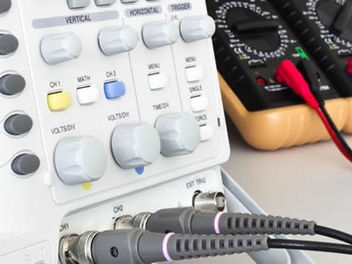Is PAT Testing Mandatory for Mobile Businesses Like Food Vans or Hairdressers?
- Guy hudson
- Jul 11
- 5 min read
Portable Appliance Testing (PAT) often raises questions among mobile business owners—"Do I really need it?" The answer lies in UK health and safety legislation and prudent risk management. Although PAT tests aren't legally mandated by name, mobile businesses like food vans and mobile hairdressers typically fall under legal duties that make regular PAT testing best practice—or even essential. Let’s explore why.
What is PAT Testing?
Portable Appliance Testing (PAT) refers to the process of inspecting and electrically testing plug-in appliances to ensure they’re safe to use. The process involves:
A visual inspection of cables, plugs, and casings
An electrical test via a PAT tester
Labelling appliances as ‘Passed’ or ‘Failed’ and logging results
PAT helps identify electrical faults, worn components, and safety hazards before they result in shocks, fires, or injury.
PAT applies to portable electrical appliances—typically anything that plugs into a socket and can be moved. It covers kettles, extension cords, hairdryers, microwaves, and more.
Is PAT Testing Legally Required in the UK?
Strictly speaking, PAT testing is not a legal requirement. However, employers and business owners are legally required to ensure electrical equipment is safe. This obligation is detailed in several key regulations:
The Electricity at Work Regulations 1989: Requires all electrical systems to be maintained to prevent danger.
Health and Safety at Work Act 1974: Employers must protect the health, safety, and welfare of employees and the public.
Provision and Use of Work Equipment Regulations 1998 (PUWER): Equipment must be suitable and maintained in a safe condition.
The Management of Health and Safety at Work Regulations 1999: Emphasises risk assessments and appropriate controls.
Although none of these laws mention PAT testing explicitly, regular inspection and testing are the most common methods used to meet the obligations.
Why PAT Testing is Important for Mobile Businesses
Mobile businesses often operate in non-standard, high-risk environments:
Outdoor exposure (rain, dust, varying temperatures)
Frequent transport of equipment
Repeated plugging and unplugging
Use of generators or temporary power sources
Close proximity to the public
This level of exposure increases the risk of electrical faults. Damaged cables, loose connections, or internal faults could go unnoticed without testing—and a single fault could result in serious injury or death.
For mobile catering businesses, many local authorities require proof of PAT testing to issue a licence. For example, Norwich City Council recommends annual PAT for catering appliances. Some insurance providers also require PAT documentation to validate claims related to electrical fires or accidents.
Equipment That Should Be PAT Tested
Mobile businesses typically rely on a range of electrical appliances, including:
For food vans:
Hot water urns
Microwaves
Toasters, grills, fryers
Fridges and cool boxes
Extension leads and RCDs
For mobile hairdressers:
Hairdryers
Curling wands and straighteners
Clippers
Lamps and fans
Other common appliances:
Phone/laptop chargers
Card readers and POS terminals
Kettles or coffee machines for staff
As a general rule, all Class I (earthed) and Class II (double insulated) appliances that are portable or movable should be PAT tested.
How Often Should You PAT Test?
There’s no one-size-fits-all answer. Testing frequency depends on the type of equipment, how it’s used, and the environment. However, industry best practice offers some guidance:
Equipment Type | Suggested PAT Testing Frequency |
High-risk mobile equipment | Every 6 to 12 months |
Low-risk fixed equipment | Every 2 to 4 years |
Extension leads used outdoors | Every 6 months |
Public-facing appliances | Annually or biannually |
Mobile businesses usually test appliances more frequently due to higher exposure to wear and damage. Regular testing helps you spot faults early and reduce risk.
Who Can Perform PAT Testing?
PAT testing must be performed by a "competent person"—someone with sufficient knowledge, training, and equipment to carry out the tests safely.
This can be:
A qualified PAT testing technician
An in-house employee trained for PAT (e.g. with City & Guilds 2377 certification)
You don’t have to be a certified electrician, but you should understand the risks, equipment types, and safe practices for testing.
PAT Testing for Food Vans
Food vans and mobile catering trailers often need PAT testing as part of:
Food hygiene inspections
Event registration or trader applications
Insurance requirements
Most councils require proof of recent PAT tests for public-facing electrical equipment. PAT testing helps ensure that appliances such as urns, heaters, fridges, and extension cables are safe for use and won’t cause harm to staff or the public.
Using generators also raises the risk of electrical surges or improper grounding. PAT testing helps confirm that appliances can safely handle these non-standard power sources.
PAT Testing for Mobile Hairdressers and Barbers
Hairdressing equipment is often used intensively and moved around frequently. Cables may twist, wear out, or suffer hidden damage. Regular PAT testing ensures:
Hairdryers and straighteners are safe from internal faults
Clippers and razors don’t pose shock risks
Extension cords aren’t frayed or overloaded
Clients expect a safe, professional experience—and PAT testing builds trust. Some venues (such as care homes or schools) may even require PAT records before allowing on-site services.
PAT Labelling and Record-Keeping
While PAT labels are not legally required, they are a practical way to demonstrate compliance. Labels usually include:
Appliance ID
Pass or fail result
Test date and due date
In addition, maintaining a PAT register or logbook is recommended. This log can be used during audits, insurance claims, or licensing checks.
Good practice includes:
Keeping results for at least 2 years
Using software or spreadsheets to track testing schedules
Assigning each appliance a unique ID for traceability
What Happens If You Don’t PAT Test?
If your business does not demonstrate equipment safety through PAT or other methods, the risks include:
Council licence refusal or revocation
Insurance claim denial
HSE investigation or prosecution
Employee or customer injury
Damage to equipment, premises, or reputation
One high-profile case involved an 11-year-old girl who died after touching a faulty ice cream van. The business was found liable and convicted under the Health and Safety at Work Act.
Avoiding PAT testing to cut costs can backfire—both financially and legally.
Common Myths About PAT Testing
Myth 1: PAT Testing is legally required
False. The law requires equipment to be safe, but PAT is one of the best ways to achieve and prove this.
Myth 2: New equipment doesn’t need PAT testing
Even new items can be damaged in transit or by improper storage. A visual inspection is still advised.
Myth 3: Only electricians can PAT test
No—any competent person can do it with the right training and equipment.
Myth 4: Annual testing is always enough
Riskier equipment may need more frequent checks—especially in mobile environments.
Benefits of Regular PAT Testing
Aside from meeting legal obligations, PAT testing can benefit your mobile business by:
Reducing the chance of fire or electrocution
Minimising equipment downtime
Improving public perception of professionalism
Preventing costly repairs or replacements
Ensuring compliance with councils, landlords, and insurers
It’s a small investment in safety that can save you thousands in the long run.
PAT Testing Services from Global Compliance UK
At Global Compliance UK, we provide reliable and affordable PAT testing services for mobile businesses across the country. Whether you operate a food van, mobile hairdressing service, or trade at festivals and events, we can help you:
Test and certify all portable appliances
Maintain up-to-date safety records
Schedule re-tests to avoid compliance lapses
Meet insurance and licensing requirements
Our trained technicians use certified equipment and issue clear, professional reports. We also offer ongoing reminders to help you stay compliant all year round.
Final Thoughts
While PAT testing isn’t a legal requirement on its own, it plays a crucial role in demonstrating compliance with UK health and safety laws. For mobile businesses, the risks of faulty equipment are significantly higher—and so is the need for proper inspection.
If you’re a mobile food vendor, hairdresser, or similar service provider, PAT testing should be part of your regular operations. It protects your staff, your clients, your licence, and your reputation.
Ready to Book a PAT Test?
Global Compliance UK makes it easy to stay safe and compliant. Call us on 0330 100 5341 or email info@global-compliance.co.uk to arrange your PAT testing service.
Let us take care of the safety checks so you can focus on growing your mobile business with confidence.



























Comments